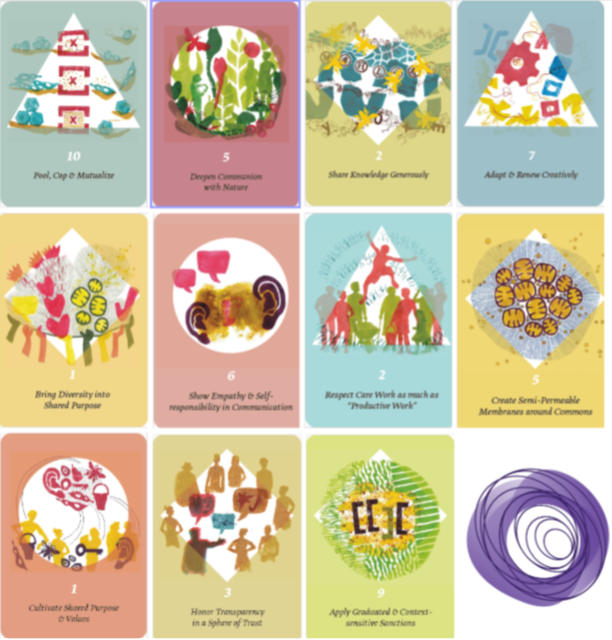Educating the Self: Students producing Video-Clips on the Pattern Language of Commoning
In our AECED Project, the German Project Team use the Pattern Language of Commoning (PLC) for supporting democracy-learning in higher education settings. While we also use the PLC in professional and organizational learning settings, this blog post focuses on its application in higher education.
Based on 400 interviews worldwide, this card deck unfolds solutionary patterns, which – with Aristotle – we can understand as eupraxia. In modern wording, we might say something like ‘best practices’. The term pattern refers to a dynamic concept that is neither prescriptive nor norming. Patterns refer to solutionary praxis, which might be adapted to support individuals, collectives and organizations “in finding solutions tailored to their needs” (cf. Helfrich & Bollier, 2020, p. 30ff.).
This collection of solutionary patterns refers to a tri-interconnected and relational notion of democracy. Just like John Dewey, the pioneer of experience-based democratic learning, Commoning sees democracy as not solely happening in our parliaments. Rather, it is cultivated in three interconnected contexts of life. Commoning refers to solutionary practices in these three fields of democratic action, proposing a “Triad of Commoning: Social Life, Peer Governance, and Provisioning“ (Bollier & Helfrich, 2019).
Such a cultural understanding of democracy involves educating ourselves, among other levels of transformative education and learning, toward solving complex problems together. The 33-pattern card deck is offered as an invitation to collectively imagine and practice deep democracy.
In order to dive deeper into such art-based and embodied creative approaches to democracy-as-becoming, the German Project Team invited students to produce video clips relating to some Pattern Language of Commoning (PLC) cards, choosing the cards they felt drawn to engage with.
The students engaged in reflecting and creating meaningful messages to the world, with the majority of connections being made to cards from the first section, “Social Life”, and choosing cards such as: “cultivate shared purpose and values”; “show empathy and self-responsibility in communication”; “deepen communion with nature” or “preserve relationships in addressing conflicts”.
Some cards from the “Peer Governance” section were also chosen to create video-clips. The clips in this field refer to the practice patterns “ritualize togetherness”, and to “be transparent in a space of trust”.
Cards from the third section “Provisioning” refer to eupraxia such as “respect care work as much as ‘productive work’”.
By reflecting on a specific eupraxia, students educate themselves through active self-activity (Sting, 2022). Such self-education arises in social spaces and social relationships as a reflexive process. It is initiated by the students themselves, in which they shape and change their relationship to the world. In this sense, such video clips offer opportunity structures and the educational potential of social spaces.
In the future, we expect more cards of this path-creating card deck to be reformulated for a broad viewership. We hope that these creative student works, reflecting their meaning-making on democracy-as-becoming, will resonate across diverse educational settings and for many contexts of a democracy-as-becoming.
The video-clips created by students can be found here. These videos showcase student work. Because they were produced in a learning context rather than professionally, some accessibility features (including transcripts) are missing. We recognise this may make them less accessible for viewers with visual impairments or processing difficulties.Literature
Bollier, D., & Helfrich, S. (2019). Free, fair, and alive: The insurgent power of the commons. New Society Publishers.
Helfrich, S., & Bollier, D. (2020). Frei, fair und lebendig – Die Macht der Commons. Transcript Verlag.
Sting, S. (2022). Selbstbildung. In F. Kessl & C. Reutlinger (Eds.), Sozialraum, Sozialraumforschung und Sozialraumarbeit (pp. 243–252). Springer Fachmedien. https://doi.org/10.1007/978-3-658-29210-2_19
Blog written by Professor Susanne Maria Weber, Philipps University of Marburg
#Education4Democracy

